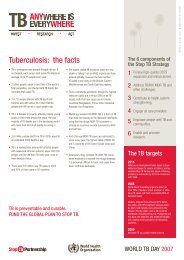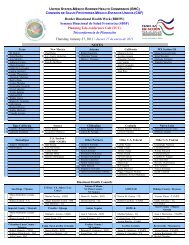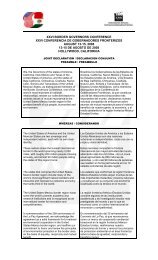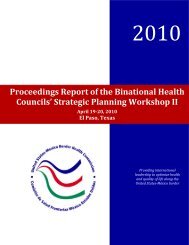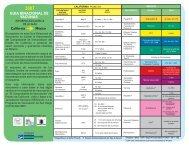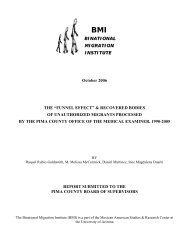National Healthcare Disparities Report - LDI Health Economist
National Healthcare Disparities Report - LDI Health Economist
National Healthcare Disparities Report - LDI Health Economist
You also want an ePaper? Increase the reach of your titles
YUMPU automatically turns print PDFs into web optimized ePapers that Google loves.
Highlights<br />
n Data on disparities are improving but still suboptimal:<br />
o The percentage of quality measures that could not be used to assess disparities decreased for all<br />
groups.<br />
o For Native Hawaiians and Other Pacific Islanders and multiple race individuals, reliable estimates<br />
were not available for more than half of the measures, making any assessment of disparities<br />
incomplete. Reliable estimates for AI/ANs and poor populations also could not be generated for<br />
a large percentage of measures.<br />
Examples of Initiatives Increasing Data on Racial and Ethnic Minority Populations<br />
Federal: The Affordable Care Act requires that all federally funded health programs and population surveys<br />
collect and report data on race, ethnicity, and primary language and supports use of data to analyze and track<br />
health disparities (Andrulis, et al., 2010). To improve the quality of data collected in population surveys,<br />
HHS published Data Standards for Race, Ethnicity, Sex, Primary Language, and Disability in October<br />
2011 (Office of Minority <strong>Health</strong>, 2011). New standards for race and ethnicity expand upon but roll up to the<br />
1997 Office of Management and Budget data collection standards<br />
(minorityhealth.hhs.gov/templates/content.aspxID=9227&lvl=2&lvlID=208). To strengthen data collection<br />
in Medicaid and Children’s <strong>Health</strong> Insurance Programs, HHS evaluated these programs and recommended<br />
improvements in the report Approaches for Identifying, Collecting, and Evaluating Data on <strong>Health</strong> Care<br />
<strong>Disparities</strong> in Medicaid and CHIP. Recommendations include aligning the Medicaid Statistical<br />
Information System, Medicare Current Beneficiary Survey, and Consumer Assessment of <strong><strong>Health</strong>care</strong><br />
Providers and Systems with the new data standards<br />
(www.healthcare.gov/law/resources/reports/disparities09292011a.pdf).<br />
State: In Massachusetts, all acute care hospitals are required to collect information on race and ethnicity<br />
from every patient with an inpatient stay or emergency department visit. Hospitals must use a standardized<br />
set of race categories as well as 31 ethnicity categories, and the State provides a tool to assist with collection<br />
(Weinick, et al., 2007). The Wisconsin <strong>Health</strong> Care Information Section has collaborated with various<br />
stakeholders to improve collection of information on race and ethnicity. It worked with AI/AN Tribes and<br />
the State’s cancer database to cross-reference tribal clinic data. It also worked with a leading Hmong<br />
organization to distribute a patient brochure in English and Hmong highlighting the importance of reporting<br />
ethnicity to hospitals (Hanlon & Raetzman, 2010).<br />
Provider: Aetna began collecting data on race and ethnicity from members in 2002, the first major health<br />
plan to do so. Information is collected electronically and on paper forms. More than 60 million Aetna<br />
members have provided data on race, ethnicity, and primary language. The Alliance of Chicago Community<br />
<strong>Health</strong> Services developed an EHR that merges clinical data with standardized race and ethnicity data stored<br />
in the practice management system. This allows assessments of disparities across the four participating<br />
community health centers (IOM, 2009).<br />
30 <strong>National</strong> <strong><strong>Health</strong>care</strong> <strong>Disparities</strong> <strong>Report</strong>, 2011



